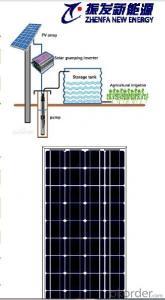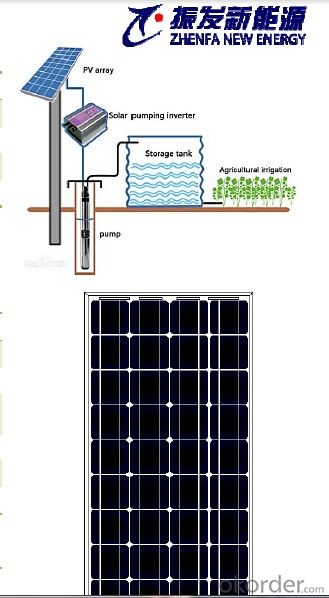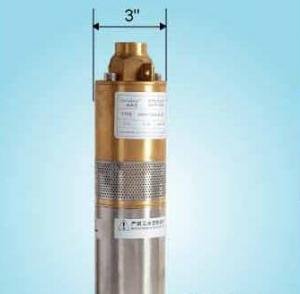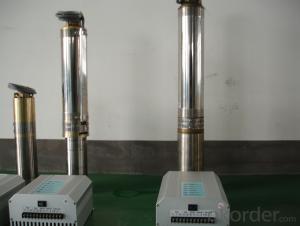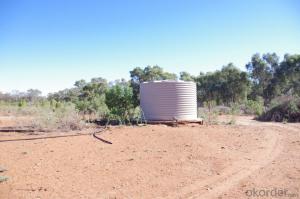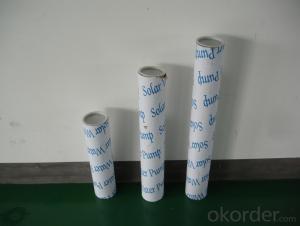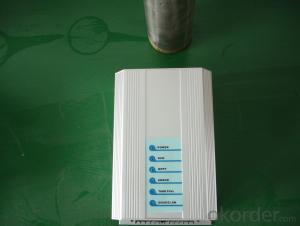Zhenfa 120W-140W Solar DC Pump with Timer
- Loading Port:
- China Main Port
- Payment Terms:
- TT OR LC
- Min Order Qty:
- -
- Supply Capability:
- -
OKorder Service Pledge
Quality Product, Order Online Tracking, Timely Delivery
OKorder Financial Service
Credit Rating, Credit Services, Credit Purchasing
You Might Also Like
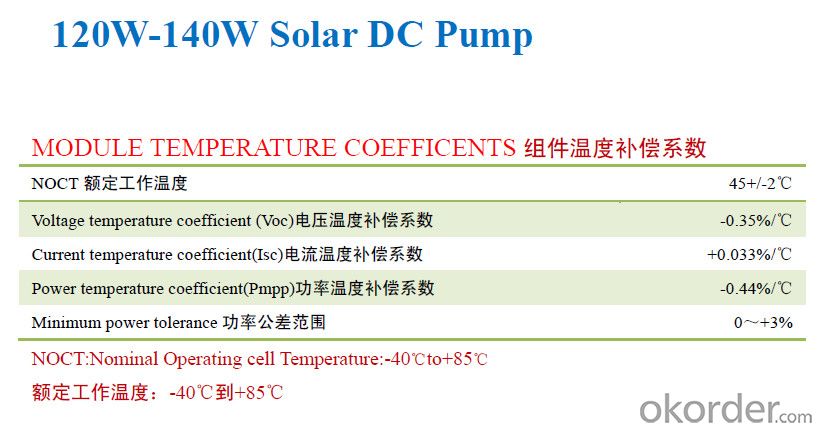
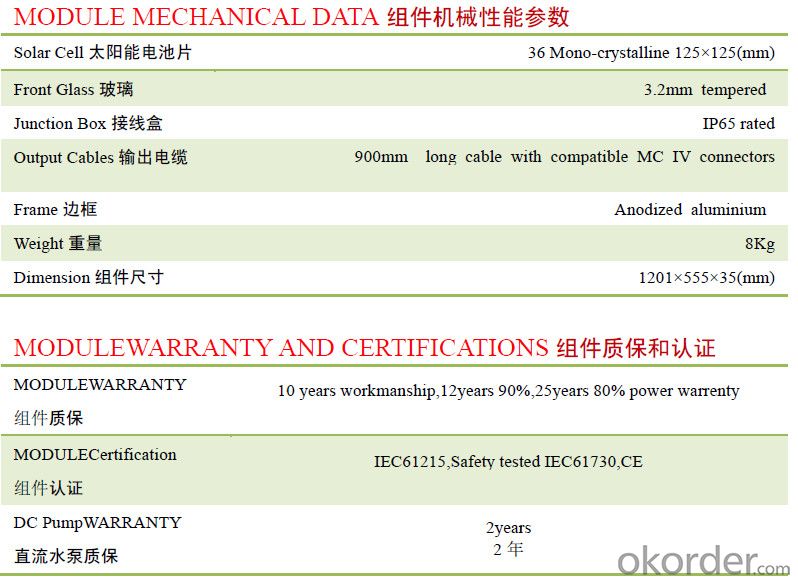
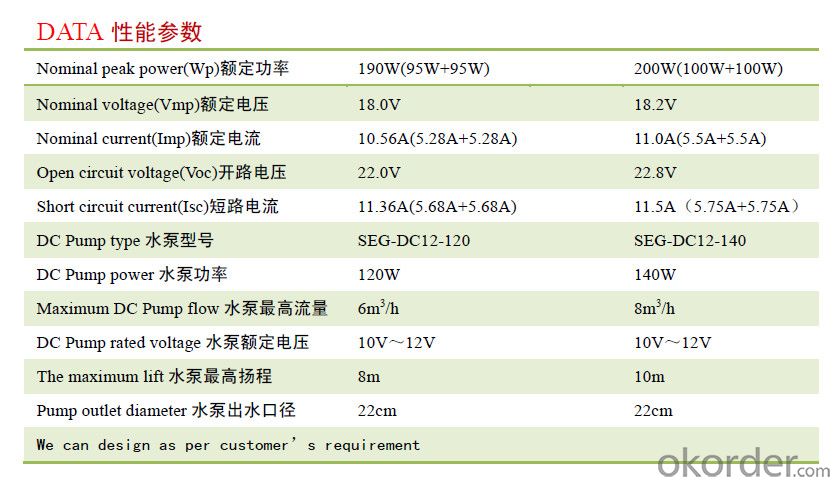
In certain emerging markets, Zhenfa new energy offers home owners complete residential solar system solutions to meet their green energy needs. Zhenfa's residential solar power systems are designed to meet different building applications in system sizes of 1.68kW and 3.9kW. Zhenfa also provides customized solar system solutions for special solar power systemapplications.
- Q: Can a solar pump be used for water supply in military or defense operations?
- Yes, a solar pump can be used for water supply in military or defense operations. Solar pumps are a reliable and sustainable option for remote locations where access to electricity may be limited. They can provide a continuous water supply, reducing the reliance on traditional fuel-powered pumps and minimizing logistical challenges. Additionally, solar pumps are quiet, which can be advantageous in military operations where noise reduction is crucial.
- Q: How does the size of the solar panel affect the performance of the pump?
- The size of the solar panel has a direct impact on the performance of the pump. A larger solar panel generally means a higher capacity to absorb sunlight and convert it into electricity. This results in a greater amount of energy being available to power the pump. As a result, the pump can operate at a higher flow rate or pressure, allowing it to deliver more water or perform more effectively. On the other hand, a smaller solar panel may have a lower capacity to generate electricity. This can limit the amount of energy available to power the pump, resulting in reduced performance. The pump may operate at a lower flow rate or pressure, which can limit its ability to deliver water or perform optimally. Additionally, the size of the solar panel also affects the amount of energy stored in the system's battery. A larger solar panel can generate more excess electricity, which can be stored in the battery for use during cloudy or low sunlight periods. This ensures a more consistent and reliable performance of the pump, even in less favorable weather conditions. In summary, the size of the solar panel directly influences the performance of the pump by determining the amount of energy available for operation. A larger solar panel generally leads to better performance, while a smaller one may result in reduced efficiency and output.
- Q: What is the role of inverters in a solar pump system?
- Inverters play a crucial role in a solar pump system by converting the direct current (DC) electricity produced by the solar panels into alternating current (AC) electricity required to power the pump. They also regulate the voltage and frequency of the electricity to ensure optimal performance and efficiency of the pump system.
- Q: How does the type of pump (submersible, surface, centrifugal) affect the performance of a solar pump?
- The performance of a solar pump can be greatly influenced by the type of pump used, namely whether it is submersible, surface, or centrifugal. A submersible pump is specifically designed to be submerged in the water source, like a well or borehole. This type of pump has the advantage of being able to push water to higher elevations, making it suitable for applications that involve pumping water from deep wells. Additionally, the submersible design helps to reduce energy losses as the pump is already immersed in the water, eliminating the need for long suction pipes. Consequently, a submersible solar pump can operate efficiently and effectively by harnessing the available solar energy to pump water to desired heights. On the contrary, a surface pump is installed above the water source and relies on suction to draw water into the pump. This type of pump is commonly used for shallow water sources, such as ponds or lakes. However, since the pump needs to create suction in order to pull water, it may require more energy compared to a submersible pump. The performance of a solar pump with a surface pump design can be negatively affected if the suction lift required is too high or if there are any leaks in the suction pipes, resulting in energy losses and reduced efficiency. Centrifugal pumps are commonly used in both submersible and surface pump designs. These pumps utilize rotating impellers to generate centrifugal force, which propels the water towards the pump outlet. The performance of a solar pump with a centrifugal pump design depends on various factors, such as the size of the impeller, pump efficiency, and system design. If the centrifugal pump is properly matched to the power output of the solar array, it can deliver high flow rates and efficiently pump water over long distances. However, if the pump is not appropriately sized or if the system design is not optimized, it may result in diminished performance and energy inefficiencies. In conclusion, the choice of pump type in a solar pumping system (submersible, surface, or centrifugal) can have a significant impact on its performance. Factors such as the depth of the water source, lift requirements, distance to pump water, and system design should all be taken into account when selecting the most suitable pump type for a solar pump.
- Q: Are there any limitations to the type of pump technology that can be used in a solar pump system?
- Yes, there are limitations to the type of pump technology that can be used in a solar pump system. One of the primary limitations is the power output of the solar panels. The pump technology used must be compatible with the power output of the solar panels in order to efficiently and effectively pump water or other fluids. Another limitation is the size and weight of the pump. Solar pump systems are often used in remote locations where transportation and installation can be challenging. Therefore, the pump technology used must be compact and lightweight to facilitate easy transportation and installation. Additionally, the type of fluid being pumped can also impose limitations on the pump technology. For example, if the fluid being pumped is corrosive, the pump technology used must be able to withstand the corrosive properties of the fluid. Furthermore, the depth and distance that the pump needs to move the fluid can also impact the type of pump technology that can be used. Different pump technologies have different limitations in terms of the maximum depth and distance they can effectively pump fluids. Lastly, budget constraints can also be a limitation when choosing the pump technology for a solar pump system. Some pump technologies may be more expensive than others, and the available budget may limit the options in terms of pump technology selection.
- Q: Are there any limitations on the maximum height or elevation that a solar pump can pump water?
- Yes, there are limitations on the maximum height or elevation that a solar pump can pump water. The pump's maximum pumping height is determined by factors such as the power of the solar panels, the efficiency of the pump, and the atmospheric pressure. Typically, solar pumps can lift water to a maximum height of around 100-200 meters, but this can vary depending on the specific model and setup.
- Q: What is the impact of a solar pump on groundwater levels?
- A solar pump has a positive impact on groundwater levels as it utilizes solar energy to extract water from underground sources. This sustainable alternative to traditional pumps reduces reliance on fossil fuels and minimizes environmental impact. By efficiently extracting water, it helps maintain or replenish groundwater levels, contributing to the overall conservation and sustainability of water resources.
- Q: How does the elevation of the water source affect the performance of a solar pump?
- The elevation of the water source can significantly affect the performance of a solar pump. The elevation determines the vertical distance that the water needs to be lifted, which directly impacts the amount of energy required by the pump to overcome this elevation. When the water source is located at a higher elevation, the pump needs to work against gravity to lift the water to the desired height. This means that more energy is needed to overcome the additional head pressure, resulting in decreased pump performance. The higher the elevation, the more energy the solar pump needs to generate to lift the water effectively. On the other hand, if the water source is closer to the surface or at a lower elevation, the pump has to exert less energy to lift the water, resulting in improved performance. The pump can work more efficiently, requiring less energy from the solar panels to achieve the desired flow rate. It is important to consider the elevation of the water source when selecting a solar pump system. The pump's capacity and power rating should be suitable for the specific elevation requirements to ensure optimal performance. Additionally, the solar panels' capacity should be determined based on the energy needed to overcome the elevation, ensuring that sufficient power is available to run the pump effectively. In summary, the elevation of the water source directly affects the performance of a solar pump. Higher elevations require more energy and can decrease pump performance, while lower elevations allow for improved efficiency and better pump performance. Proper consideration of the water source's elevation is crucial in designing and selecting a solar pump system.
- Q: What is the maximum depth that a solar pump can draw water from?
- The maximum depth that a solar pump can draw water from depends on various factors such as the type and efficiency of the pump, the power of the solar panels, the size of the water source, and the distance between the pump and the water source. However, on average, most solar pumps have a maximum suction lift of around 20 to 30 feet (6 to 9 meters). Some advanced solar pumps with more powerful panels and higher efficiency can achieve a maximum suction lift of up to 100 feet (30 meters) or more. It is essential to consider these factors and consult the specifications provided by the manufacturer to determine the maximum depth that a particular solar pump can draw water from.
- Q: Can a solar pump be used for both residential and commercial purposes?
- Yes, a solar pump can be used for both residential and commercial purposes. Solar pumps are versatile and can be installed in various settings, making them suitable for both small-scale residential applications, such as garden irrigation or water supply, as well as larger-scale commercial uses like agricultural irrigation, livestock watering, or industrial water management. The ability to harness the power of the sun makes solar pumps an environmentally friendly and cost-effective option for both residential and commercial users.
Send your message to us
Zhenfa 120W-140W Solar DC Pump with Timer
- Loading Port:
- China Main Port
- Payment Terms:
- TT OR LC
- Min Order Qty:
- -
- Supply Capability:
- -
OKorder Service Pledge
Quality Product, Order Online Tracking, Timely Delivery
OKorder Financial Service
Credit Rating, Credit Services, Credit Purchasing
Similar products
Hot products
Hot Searches
Related keywords
